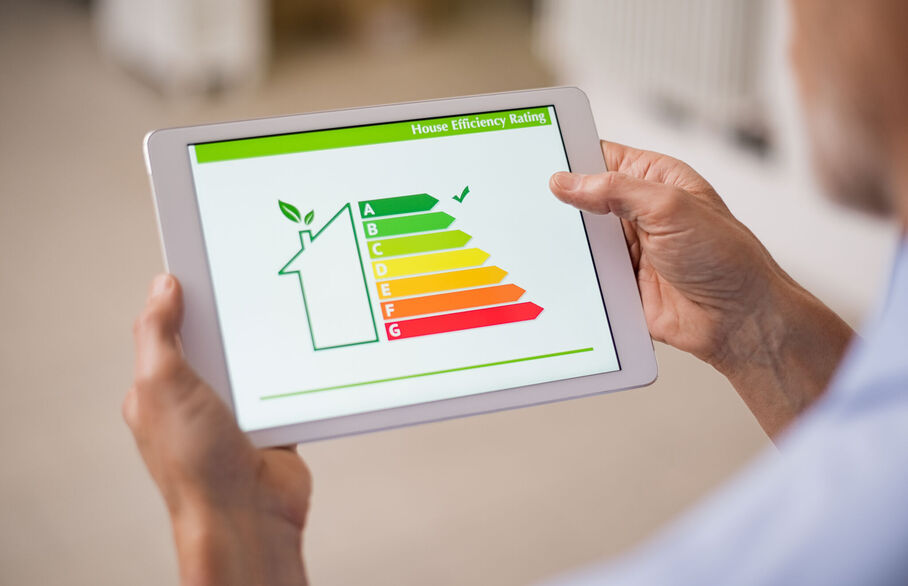Everything landlords need to know about EPCs

If you are selling or renting out a property in the UK, it is a legal requirement to have a valid Energy Performance Certificate (EPC). If you're a first-time landlord, or a current landlord who just wants a refresher, read our blog on EPCs, what they are, and how your home can meet the minimum energy efficiency standards.
What does an EPC include?
EPCs assess the energy efficiency of a property and provide a rating from A (most efficient) to G (least efficient). They are valid for 10 years and must be provided to prospective tenants before a tenancy begins. The EPC includes details on the property’s energy use, heating systems, lighting, and carbon dioxide emissions. It also offers recommendations for improving energy performance, which can range from simple upgrades like switching to LED bulbs to more substantial changes such as installing insulation or renewable energy systems.
Minimum Energy Efficiency Standards (MEES)
Under the Minimum Energy Efficiency Standards (MEES), it is unlawful to let a property with an EPC rating below Band E unless a valid exemption is registered. This regulation applies to all domestic private rented properties in England and Wales. Landlords must ensure their properties meet this standard before letting or renewing a tenancy as failure to comply with MEES can result in fines of up to £5,000.
What are the EPC exemptions?
Where an exemption applies, the exemption must be registered by the landlord before it can be relied on; this registration is made on a self-certification basis and an exemption will apply from the point at which it is registered.
There are specific circumstances under which a landlord may be exempt from meeting the minimum EPC rating. While the list is not exhaustive, these include:
High cost exemption
If the cheapest recommended energy efficiency improvement would cost more than £3,500 (including VAT), the property is exempt. You’ll need to provide three quotes with accompanying evidence from qualified installers showing the costs exceed this threshold.
All improvements made
If you’ve carried out all the recommended cost-effective improvements and the property still doesn’t meet the minimum EPC rating of E, you can register this exemption. Evidence of completed works and the updated EPC is required.
Third-party consent not granted
Some improvements may require consent from third parties. These can include tenants, mortgage lenders, or planning authorities. If consent is refused or unattainable despite reasonable efforts, landlords may claim this exemption.
Property devaluation
If a qualified surveyor confirms that making the recommended improvements would reduce the property’s market value by 5% or more, landlords can apply for this exemption. A formal valuation report is required.
Wall insulation exemption
If cavity wall, internal wall, or external wall insulation is recommended but a qualified expert determines it would negatively affect the property’s structure or fabric, this exemption applies. A written report from the expert is needed.
Listed buildings or conservation areas
If energy efficiency improvements would unacceptably alter the character or appearance of a listed building or one in a conservation area, the property may be exempt. Planning advice or conservation officer input is typically required.
Exemptions must be registered on the Private Rented Sector (PRS) Exemptions Register and supported by appropriate evidence.
Future changes: EPC Band C by 2030
Although earlier proposals to require a Band C rating by 2025 were withdrawn, the UK government has confirmed its intention to raise the minimum EPC rating to Band C by 2030. This change will apply to both new and existing tenancies and is part of the national strategy to reduce carbon emissions and improve housing standards. Landlords are encouraged to begin planning for these changes now. Improvements may include upgrading insulation, replacing inefficient heating systems, and installing double glazing where possible.
Improving your EPC rating
To meet current and future standards, landlords should follow the recommendations listed in their EPC report. Common improvements include:
- Installing loft and cavity wall insulation
- Upgrading to energy-efficient boilers or heat pumps
- Switching to LED lighting
- Sealing draughts and improving glazing
These upgrades not only ensure compliance but also make properties more attractive to tenants and can reduce long-term maintenance costs.
Staying compliant with EPC legislation is essential both from a legal standpoint and to protect tenants and future-proof your investment. While the current legal minimum remains Band E, there will be a shift toward Band C by 2030. Landlords who act early will benefit from smoother compliance, better tenant retention, and access to financial support.
If you’re unsure about your property’s EPC status or are looking to upgrade, our Fully Managed landlord service includes expert guidance on compliance - contact us today and speak to one of our lettings experts.
This information is accurate as of October 2025. For the latest updates, please refer to official government sources.






